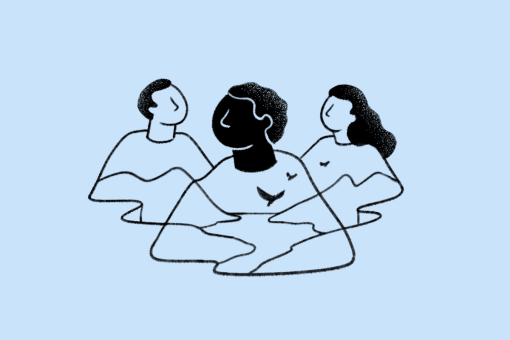Mental health has never been talked about more than since the beginning of the pandemic. But it would be wrong to assume that the stigma surrounding people affected by mental health issues has disappeared.
This stigma has existed for centuries and is rooted in superstitions and beliefs that are deeply ingrained in the collective imagination.
But this doesn’t mean that mindsets can’t be changed. However, it will take more than two years and a pandemic to accomplish such an ambitious goal.
stigmatization and mental health: diehard taboos
Short of giving a lecture on etymology, the word “stigmatize” once meant to burn the flesh with a red-hot iron.
Today, there are several definitions of the word “stigmatize,” but the idea of “branding” or labelling a person remains. According to the Groupe provincial sur la stigmatisation et la discrimination en santé mentale, “a stigma [is] a mark of shame, disgrace, and disapproval that causes a person to be avoided and rejected by others. All mental health issues carry a stigma, but, generally, it is more pronounced when a person’s behaviour is markedly different from that of others.”
Whereas discrimination refers to behaviours, stigmatization refers to attitudes, of which there are three types:
- Public stigmatization, or the attitude of the general population;
- Structural stigmatization, or attitudes within different systems and institutions (education, policies, law, media, etc.)
- Self-stigmatization, or the internalization of society’s stereotypes and prejudices.
Regardless of the type, stigmatization is based on prejudices and myths about people living with mental health issues:
These are only a few of the prejudices that persist to this day, and they are far from being harmless.
the consequences of stigmatization
Stigmatization is bad for mental health and the well-being of people who are subjected to it. It prevents 60% of people living with a mental health disorder from seeking help because they are afraid of being judged. It also delays the diagnosis of anxiety, depression and bipolarity.
Stigmatization can also affect many people’s self-esteem and cause them to devalue themselves. For this reason, it can be said that self-stigmatization is a consequence of stigmatization. After experiencing negative attitudes over an extended period, people living with mental health disorders begin to adopt those attitudes toward themselves.
On top of mental health and self-perception being affected by stigmatization, physical health can also be at risk. Medical staff may incorrectly attribute the symptoms of a physical illness to a previously diagnosed mental health disorder. For example, a doctor might associate abdominal pain with anxiety in a person already diagnosed with an anxiety disorder. This prejudice could slow down the diagnosis and treatment of a physical health problem and could have dire consequences.
The effects of stigmatization vary depending on the situation. Stigmatization at work will be different from stigmatization in one’s personal life. It also varies depending on the person who is being stigmatized. The stigmatization of people with mental health problems is, for example, more prevalent in Black communities, as shown by a study conducted by Ottawa Public Health. Friends and family of a person living with a mental health disorder also face a type of stigmatization called “stigma by association.”
Stigmatization is therefore a major obstacle to our collective mental health, and we are long overdue to take a closer look at it.
destigmatization: when will the prejudice surrounding mental health end?
Stigmatization feeds on fear, ignorance, and disinformation. For this reason, national initiatives such as Opening Minds from the Mental Health Commission of Canada are very important. They help to educate the public and raise awareness about the reality of living with mental health issues.
Employers also have a role to play as 4 in 10 Canadians still don’t feel comfortable discussing mental health in the workplace.
People living with or who have lived with a mental health issue can also help to dismantle taboos by sharing their stories, provided they respect their boundaries.
Because stigmatization is a societal problem, destigmatization requires collective action. That said, we’re on the right track, and taboos are being knocked down one after the other.
Let’s keep the conversation going.
Mental health should be shared
Relief would like to acknowledge the contribution of Charles Saliba-Couture to this post.




